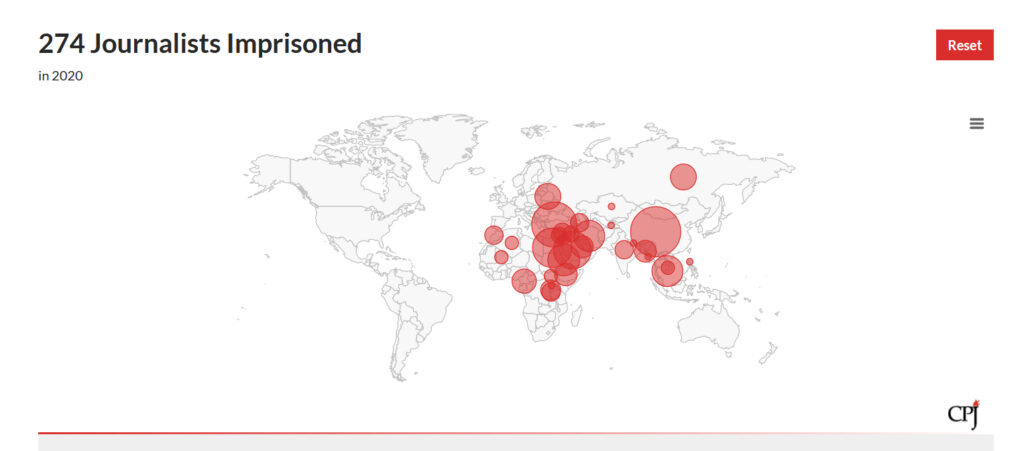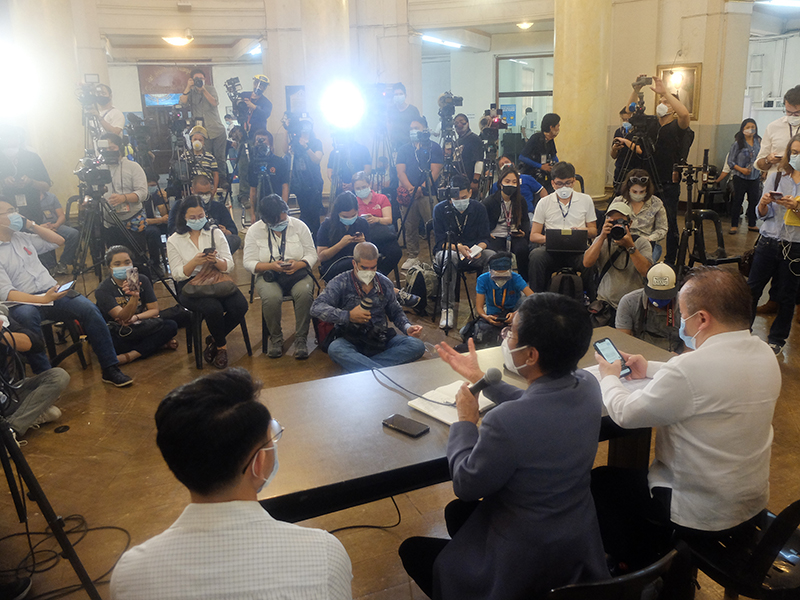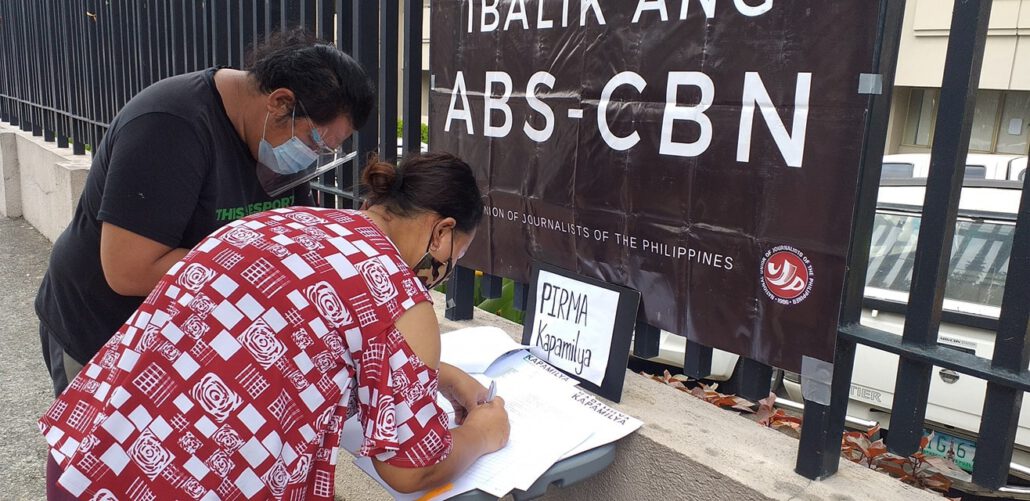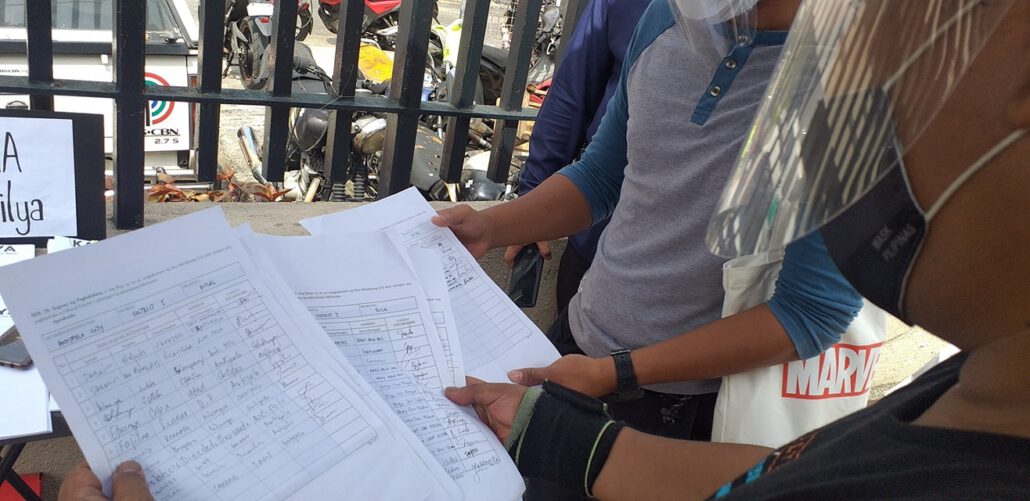2020 saw most brazen abuses vs journalism—NUJP
The year 2020 had been particularly bad for journalism in the Philippines that saw more media workers killed, arrested, jailed and lose their jobs, the National Union of Journalists of the Philippines (NUJP) reported.
The media group said four journalists have been killed in the Philippines, including Cornelio Pepino in Negros Oriental last May 5; Jobert Bercasio in Sorsogon last September 14; Virgilio Maganes in Pangasinan last November 10; and Ronnie Villamor in Masbate last November 14.
Villamor was shot dead by the Philippine Army that claimed the journalist was a communist supporter and killed in an encounter.
Maganes, who survived the first slay attempt against him in 2016 by playing dead, was killed inside their family compound in Villasis, Pangasinan.
“Their deaths have brought the total of media killings under Duterte to 19, and to 191 since 1986,” the NUJP said.

Their killing of four Filipino media workers figured in the list of 60 journalists killed worldwide in 2020 by the Brussels-based International Federation of Journalists (IFJ).
The IFJ list made the Philippines the fourth most dangerous country for journalists in the world in 2020, along with Syria and after India (8 killed), Pakistan (7), Afghanistan (7).
The list made the country the most dangerous in Southeast Asia as well.
Twenty-seven journalists were killed in the Asia-Pacific, the most dangerous region for journalists in 2020.
Arrests and detention
Seven journalists have also been arrested, at least two of whom remain detention, both women and executives of alternative media outfits.
Those arrested in 2020 include Glenn Jester Hitgano in Jan. 21 (arbitrarily arrested during coverage); Frenchiemae Cumpio in Feb. 7 (illegal firearms possession); Ramil Traya Bagues in Aug. 18 (cyber-libel); Rommel Ibasco Fenix in Sept. 15 (libel and violation of Anti-Photo and Video Voyeurism Act of 2009); Virgilio Avila Jr. in Nov. 10 (cyber-libel); Mia Concordia in Nov. 10 (cyber-libel); and Lady Ann Salem in Dec. 10 (illegal possession of firearms and explosives).
Cumpio, executive director of alternative media outfit Eastern Vista, was sleeping at a church group’s dormitory when arrested in the dead of night.
Her case was among those cited by the United Nations Office of the High Commissioner on Human Rights report in June last year as a clear case of human rights violation.

Cumpio’s imprisonment also made it to the list of 274 journalists jailed in 2020 globally by the New-York-based Committee to Protect Journalists (CPJ).
The CPJ said the number was “a new high…as governments cracked down on coverage of COVID-19 or tried to suppress reporting on political unrest.”
Salem, editor of alternative news outfit Manila Today was arrested, of all days, on International Human Rights Day.
The NUJP has reported Salem’s case to the CPJ but the latter’s list has yet to include her name.
Salem is currently is in a Covid-19 isolation protocol at the Mandaluyong City Jail after her transfer from the Philippine National Police’s jail facility at Camp Crame.

The rest of the arrested Filipino journalists were able to post bail, except Bagues whose current status the NUJP is trying to find out.
Red-tagging and charges
The NUJP said that the Philippine government had been especially vicious against the press the past year as compared to the first three years of the Rodrigo Duterte government.
“[B]ad as the first three years were, 2020 trumped them all as Duterte and his minions ramped up their attacks on the free press even as the COVID-19 pandemic began to make its deadly grip felt,” the NUJP said.
The media group said the Duterte government displayed a “most brazen abuse of state power” by red-tagging journalists and media institutions.
Aside from Cumpio and Salem, various government agencies and officials red-tagged alternative media outfits Kodao Productions, Bulatlat, Pinoy Weekly, Northern Dispatch, Panay Today, Manila Today, Radyo Natin-Guimba as well as dominant media organizations ABS-CBN, Rappler, CNN-Philippines, among many others.
Veteran journalist and NUJP director and former chairperson Nestor Burgos Jr. had also been red-tagged.
Editors and staff of Baguio City-based Northern Dispatch faced various police-instigated charges in court throughout last year.
Rappler CEO Maria Ressa and former researcher-writer Rey Santos Jr. were judged guilty in June last year of libelling a businessman with links to Duterte.

ABS-CBN closure
The NUJP said the pandemic gave Duterte convenient cover to make good his repeated threats to shut down ABS-CBN, the Philippines’ biggest media conglomerate.
As threats of arrest forced the growing crowds that had rallied to the beleaguered network since late last year to stand down, the House of Representatives allowed ABS-CBN’s franchise to lapse, forcing the network to stop broadcasting on May 5.
On May 5, the network stopped broadcasting and, two months later, in June, the majority of the House committee on congressional franchises sealed its fate, voting to deny it a new franchise to operate.
Duterte thus become the second president after Ferdinand Marcos to force ABS-CBN off the air, the NUJP said.
The closure left thousands jobless and the loss of ABS-CBN regional stations also left many areas without their major source of news and entertainment.
The full extent of this would become clear during typhoons Rolly and Ulysses that caught millions of victims previously dependent on ABS-CBN news and alerts unaware of the hazards of the disasters, the NUJP said.

Bright spots
All was not gloomy in 2020, however, as there had been bright spots in the local media community’s defense of press freedom, the NUJP said.
“Not least of this was the successful push to have UNESCO revert the status of the Ampatuan massacre to ‘unresolved’ after it was pointed out that the legal process is not finished and 76 suspects are still at large and will need to be tried should they be arrested, the media group said.
The NUJP also cited other notable victories such as the case of GMA workers who sued the network over unfair labor practices
In February, the Court of Appeals decided to reinstate, with no loss of seniority and with full back wages, 51 employees who had been illegally terminated while the Supreme Court in September ruled to reinstate 30 cameramen and assistant cameramen illegally dismissed by GMA in 2013.
The NUJP also said that despite “continuing efforts of the enemies of truth to spread disinformation, the media community has, by and large, successfully fended them off, including the paid influencers and trolls of government.”
“As we thankfully bid goodbye to 2020, we are also aware of what could be even greater challenges and threats to freedom of the press and of expression in 2021 and beyond…And so we look forward to 2021 resolved to continue defending and pushing the boundaries for press freedom in our land,” the NUJP said. # (Raymund B. Villanueva)



